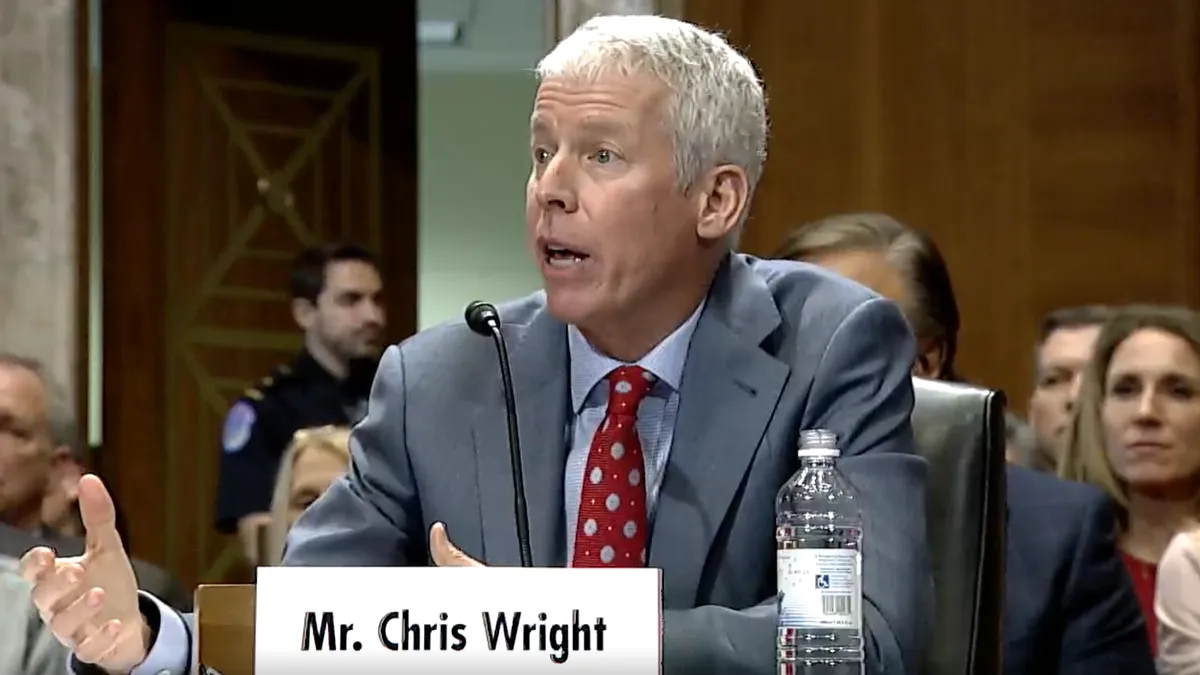Liberty Energy Chairman and CEO Chris Wright would aim to increase U.S. power supplies to help lower electricity prices if confirmed to be secretary of the Department of Energy, he told the Senate Energy and Natural Resources Committee on Wednesday.
“The only way you can drive down the price of a critical commodity is to grow the supply, so there's going to be many different avenues to pursue this,” Wright said during his confirmation hearing. “I'm 100% committed to growing our electricity grid and our energy production and removing those barriers that are standing in the way.”
Wright said he would like the United States to grow all sources of “affordable, reliable … pure energy,” including renewable energy.
During the latest presidential campaign, President-elect Donald Trump said he would cut electricity bills in half within 12 months of taking office.
If confirmed by the Senate, Wright said he would have three immediate priorities: expanding energy production and cutting energy costs, accelerating the work of DOE’s national laboratories and building energy infrastructure.
“We must prioritize cutting red tape, enabling the private sector investments and building the infrastructure we need to make energy more affordable,” Wright said.
The U.S. needs to build out its transmission system, according to Wright. “Being able to build new transmission lines, to be able to repower existing transmission lines and grow their capacity, and many other things are very important to meet this growing demand of energy and hopefully return to a trend of a decline in the real cost of electricity and a growth in [grid] reliability,” Wright said.
Committee Chairman Mike Lee, R-Utah, asked Wright if he would immediately stop DOE’s Loan Program Office from issuing new loans to address a mid-December interim report from the department’s inspector general that said contractors working for the office had conflicts of interest.
“I will immediately engage in that issue,” Wright said. “Nothing is more important than the integrity of the loan process.”
Sen. John Hickenlooper, D-Colo., introduced Wright at the hearing. “He is a scientist who is open to discussion and … who is a successful entrepreneur and has that ability to assess what is possible and what isn't,” Hickenlooper said.
Wright studied fusion energy at the Massachusetts Institute of Technology and did graduate work at the University of California, Berkeley, on solar energy and power electronics, according to his testimony.
He has worked in the oil and gas sector since 1992. Liberty Energy, a publicly traded oil and gas services company based in Denver, is an investor in Fervo Energy, an enhanced geothermal company; Natron Energy, which makes sodium-ion batteries; and Oklo, a small modular reactor company. Wright serves on Oklo’s board.
Wright said he would cut all his financial ties across the energy sector if he becomes DOE secretary.
Wright said climate change is a real issue. "Do I wish we could make faster progress? Absolutely. Are there things we can do with investments together through the Department of Energy to accelerate development of new energy technologies that are really the only pathway to address climate change? Absolutely, and we should have nothing but American leadership in this area."
When pressed by Sen. Alex Padilla, D-Calif., about a statement Wright made on social media downplaying links between climate change and wildfires, Wright stood by his statement. “The hype over wildfires is just hype to justify more impoverishment from bad government policies,” Wright wrote in a 2023 Linkedin post.
Wright went on to say,“It is with great sorrow and fear that I watch what's happening in your city of L.A. ... Climate change is a real and global phenomenon.”
Padilla also asked if Wright would commit to publishing and not censoring non-classified DOE research. “Absolutely,” Wright said. “The scientific process has been a key driver of our progress, of our country and of our world.”
On the issue of reviewing proposed liquefied natural gas export projects, Wright told the committee that it was important to consider how those exports could affect domestic gas prices. “Nothing is more important than the supply, the affordability and the access to energy to Americans in America,” he said.















